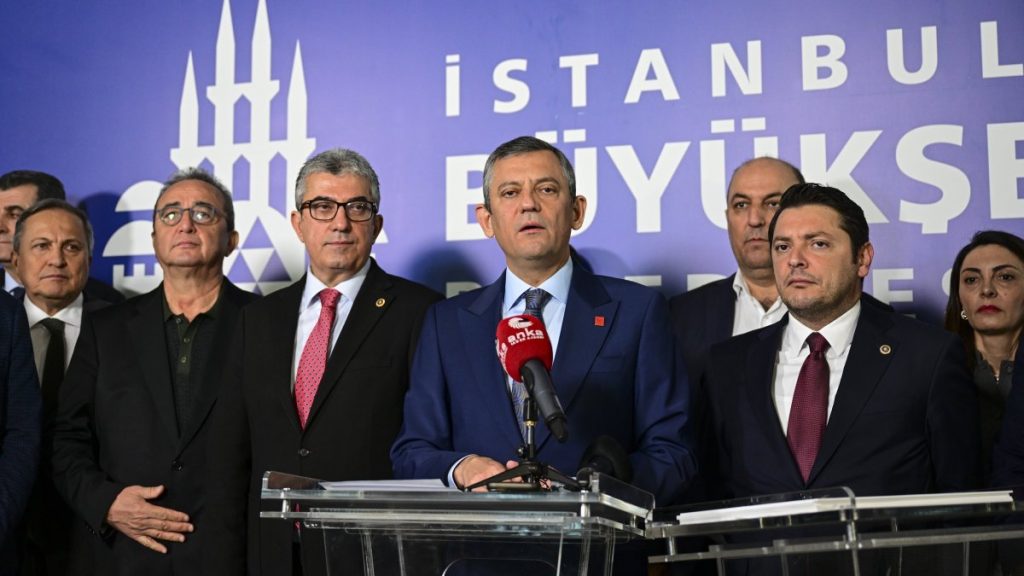Since taking office, Istanbul Mayor Ekrem Imamoğlu has been known for his controversial and turbulent governance. Recently, his name has become associated with mega corruption allegations in a striking turn of events.
Türkiye is witnessing an intense political rivalry between the ruling Justice and Development Party (AK Party) and the main opposition Republican People’s Party (CHP). While the AK Party and the Nationalist Movement Party (MHP), forming the People’s Alliance, maintain their hold on power, the CHP remains a close contender.
The CHP, Türkiye’s founding party, ruled the country under a de facto dictatorship until 1950. Over time, it became synonymous with the state itself –provincial CHP leaders also served as governors, maintaining control through military, police and bureaucratic power while keeping the nation impoverished.
CHP’s dominance
Although the CHP has struggled to regain outright power since the transition to multiparty politics, it has retained influence through military tutelage, bureaucratic dominance and the backing of major institutions like the pro-Western Turkish Industry and Business Association (TÜSIAD). This has allowed it to undermine successive ruling parties.
For this reason, the CHP, together with the tutelage institutions, has managed to overthrow all the parties that have come to power over the decades. In 1950, the Democrat Party (DP) rose to power amid Türkiye’s democratic opening, accelerated by its NATO membership. As soon as the DP came to power, it addressed the economic underdevelopment. The DP launched significant infrastructure projects, connecting towns and cities for the first time, and hence, even established Türkiye’s first football league in 1959.
However, the CHP orchestrated a coup in 1960, executing Prime Minister Adnan Menderes and reclaiming control.
Two decades later, in 1980, the CHP-aligned military elite staged another coup, reinstating military oversight.
The Turgut Özal era, with a prime ministry and presidency of a beloved political figure from 1980 through 1993, much like Menderes’ tenure, marked a period of democratization, industrialization and economic liberalization — until Özal’s mysterious poisoning death cut it short.
When conventional coups became unfeasible, the pro-coup establishment, backed by the CHP, orchestrated the “post-modern” coup of 1997 to remove Necmettin Erbakan’s Welfare Party (RP), which had sought to revitalize Türkiye’s economy in the 1990s.
Erdoğan’s Türkiye, desperate CHP
President Recep Tayyip Erdoğan’s rise marked a turning point, transforming Türkiye from an aid-dependent country that struggled to pay its civil servants into a globally competitive economy. Much like China, Türkiye achieved sustained growth independently, without Western support.
Under Erdoğan’s leadership, Türkiye has achieved remarkable transformations – not only in development but also in democratization, European Union integration processes, and the establishment of robust health, energy and transportation ecosystems. Additionally, it has made significant strides in international relations, positioning itself as a key global player. As a result, Türkiye has not only gained recognition in the eyes of the West but has also become a symbol of hope for developing nations.
Unable to counter democratization, the CHP has resorted to a different tactic.
Power of money
Upon becoming mayor of Istanbul, Imamoğlu failed to deliver significant investments or tackle the city’s urgent problems. Instead, he allegedly exploited Istanbul’s TL 850 billion ($22.3 billion) budget through a shadowy network, establishing a mafia-style financial scheme to sideline political rivals using the power of money.
This illicit financial power first manifested in the CHP’s internal elections, where Imamoğlu’s faction reportedly bribed delegates to undermine then-CHP leader Kemal Kılıçdaroğlu. His successor, Özgür Özel, lacks the authority to rein in Imamoğlu, who acts as both party boss and mayor.
And in all the election and post-election congress processes, his biggest power was money.
Recently, we woke up to the news that prosecutors had concluded a year-long investigation, uncovering extensive evidence of large-scale corruption and bribery in Istanbul. Though CHP officials dismissed it as a political witch hunt, the magnitude of the allegations – supported by witness testimonies and financial records – is staggering.
The CHP framed the case as political rather than legal, calling people to the streets in defiance. In doing so, they sought to politicize the process and divert attention from the legal investigation.
Mega-corruption
However, the challenge they faced was far from simple. At the CHP’s Istanbul Congress and the party’s grand congress, delegates alleged that they had been bribed and that their votes had been influenced by money. Moreover, most of the complaints filed in the legal proceedings came from former CHP executives, further complicating the party’s defense.
This case represents an unprecedented moment in Turkish history: a municipal administration systematically diverting public funds into a personal and political slush fund. The scale of embezzlement surpasses previous scandals, including the infamous Istanbul Water and Sewerage Administration (ISKI) affair.
A group of administrators has seamlessly transferred a pre-existing network of influence from a district municipality to the Istanbul Metropolitan Municipality (IBB), which operates with a massive $22.3 billion budget. Through an organized scheme, they systematically exploited public resources to finance politics and for personal benefits.
This is a big issue for Türkiye, and there has never been such massive-scale corruption in the history of Türkiye. We believe that in the following years, the CHP will have this discussion within itself. As legal proceedings unfold, public perception will shift. Despite the CHP-aligned media’s efforts to politicize the issue, the truth will ultimately come to light. As the legal proceedings unfold, the public will inevitably judge and hold those responsible for their wrongdoing.
Despite controlling a billion-dollar budget, Imamoğlu’s administration has failed to deliver meaningful public benefits, instead relying on inflated contracts and hollow PR stunts to maintain an illusion of progress.
The CHP’s plunge into corruption, bribery and delegate-buying has upended its internal stability. The next four to five years may compel the party to redefine itself – if it can withstand the fallout of this scandal.
Where there is law, there must be justice. We shall closely follow this critical political and legal battle in the coming days.


